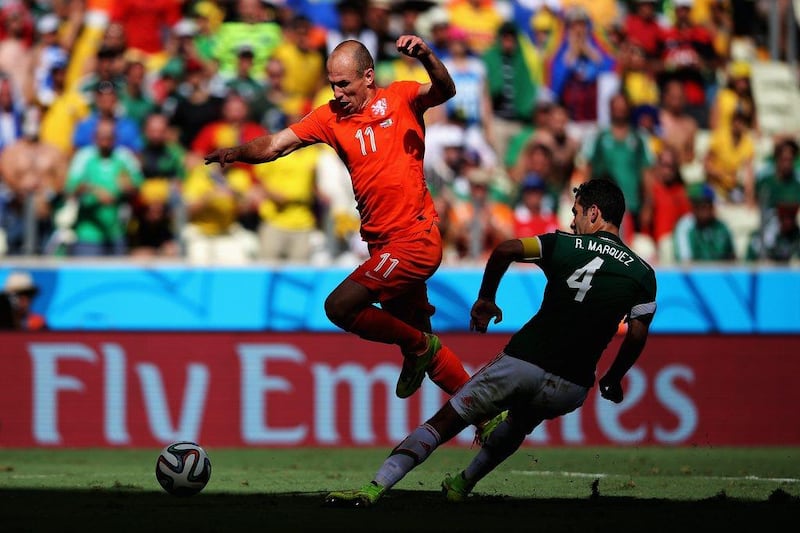Dutch star Arjen Robben remained at the centre of a diving storm Monday after the Netherlands’ controversial 2-1 World Cup win over Mexico.
Mexico coach Miguel Herrera said the penalty was “invented” and debate intensified after the Bayern Munich striker admitted he had dived in the first half in a bid to get a spot kick.
Wesley Sneijder and Klaas-Jan Huntelaar led a late Dutch fightback to beat Mexico 2-1 while Costa Rica advanced with a dramatic 5-3 penalty shoot-out win over Greece. France play Nigeria and Germany take on Algeria in Monday’s last 16 games.
[ Click here to visit The National’s World Cup 2014 landing page ]
Robben, who is often accused of going to ground too easily, fell in injury time after a tackle by Mexico’s Rafael Marquez. Portuguese referee Pedro Proenca pointed to the spot and Huntelaar stepped up to bury the winning penalty.
It came just moments after Sneijder had scored an 88th-minute equaliser to cancel out Giovani dos Santos’s superb goal for Mexico.
Robben admitted to diving in an unsuccessful attempt to win a penalty earlier in the first half.
“I really have to say and at the same time apologise in the first half I took a dive and I really shouldn’t do that,” Robben said.
“That was a stupid, stupid thing to do but sometimes you’re expecting to be struck and then they pull their leg away at the last minute.”
But he insisted he had been fouled in injury time. Mexico were furious however and coach Herrera lashed out at referee Proenca for awarding the penalty.
“The penalty was invented,” said Herrera who added that Robben should have been punished.
“The determining factor was the man with the whistle. He put us of the World Cup,” said Herrera, whose country has now lost in six consecutive last 16 games.
The Dutch now face a new Latin American test when they play Costa Rica in the quarter finals in Salvador on Saturday.
Tens of thousands celebrated with firecrackers and music in towns across the tiny Central American nation after their famous shootout victory over Greece.
Costa Rica goalkeeper Keylor Navas was the hero, saving Greece’s fourth penalty from Fanis Gekas before Michael Umana stepped up to convert the winning spot-kick for “Los Ticos.”
Costa Rica took the lead on 52 minutes through captain Bryan Ruiz.
But the dismissal of defender Oscar Duarte for his second yellow card gave the Greeks hope and with just seconds remaining, Navas could only parry a shot from Fanis Gekas, and Sokratis Papastathopoulos was on hand to sweep home the equaliser.
Extra time came and went with no new goals, forcing the shoot-out lottery and Navas’ heroics.
Attention focuses Monday on the France-Nigeria and Germany-Algeria last 16 games which sparked a security alert in Europe.
French authorities appealed for calm ahead as Algeria’s two previous games was followed by unrest in many French cities. The coincidence of France playing the same day heightened fears of World Cup trouble.
Africa has never had two teams in the last 16 and if both can pull off upset wins, they will meet in the quarter finals and an African nation will be guaranteed a first ever place in the semi-finals.
French coach Didier Deschamps and Germany’s Joachim Loew know however that if they win, their sides will clash in the quarter finals.
France take on Nigeria in Brasilia at 1600 GMT while Germany play Algeria in Porto Alegre at 2000 GMT.
Germany have played Algeria twice – at the World Cup in 1982 and in a 1964 friendly – and lost both games, but it is Vahid Halilhodzic’s Algeria who have revenge on their mind.
The Desert Foxes have “not forgotten” 1982; when West Germany lost 2-1 to Algeria and then played out a 1-0 win over Austria that ensured the European neighbours qualified for the second round. The game has gone down in football history as “The Shame of Gijon”, after the Spanish city where it was played.
Follow us on Twitter @SprtNationalUAE





